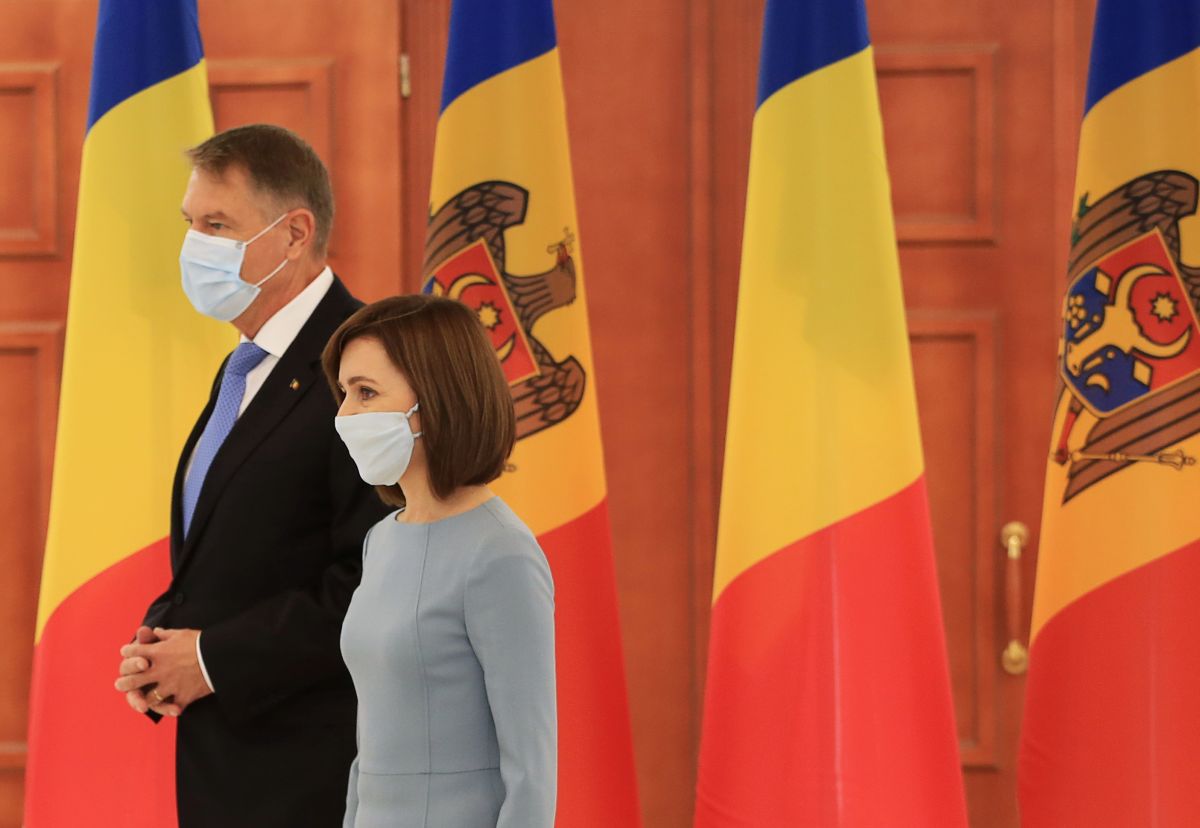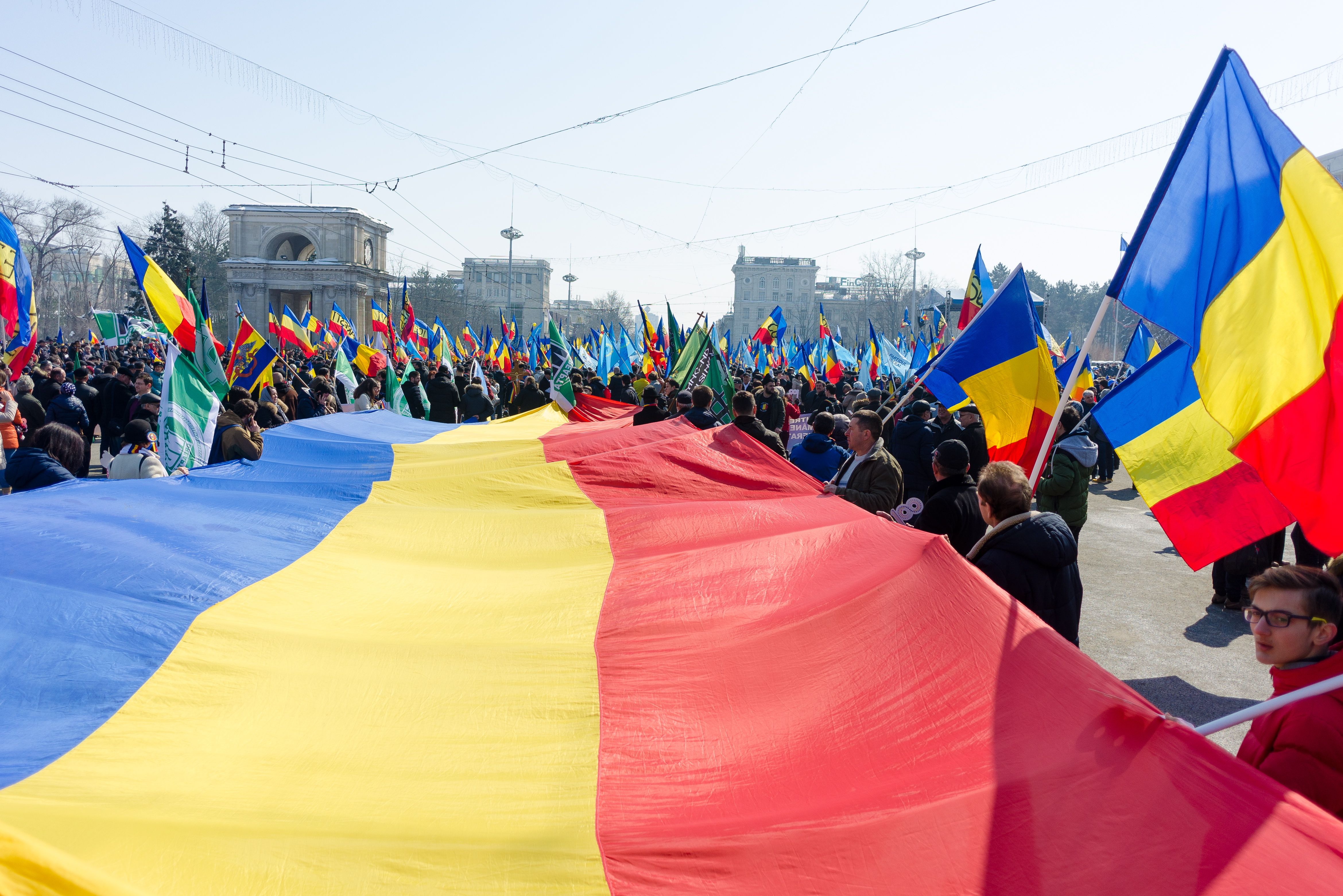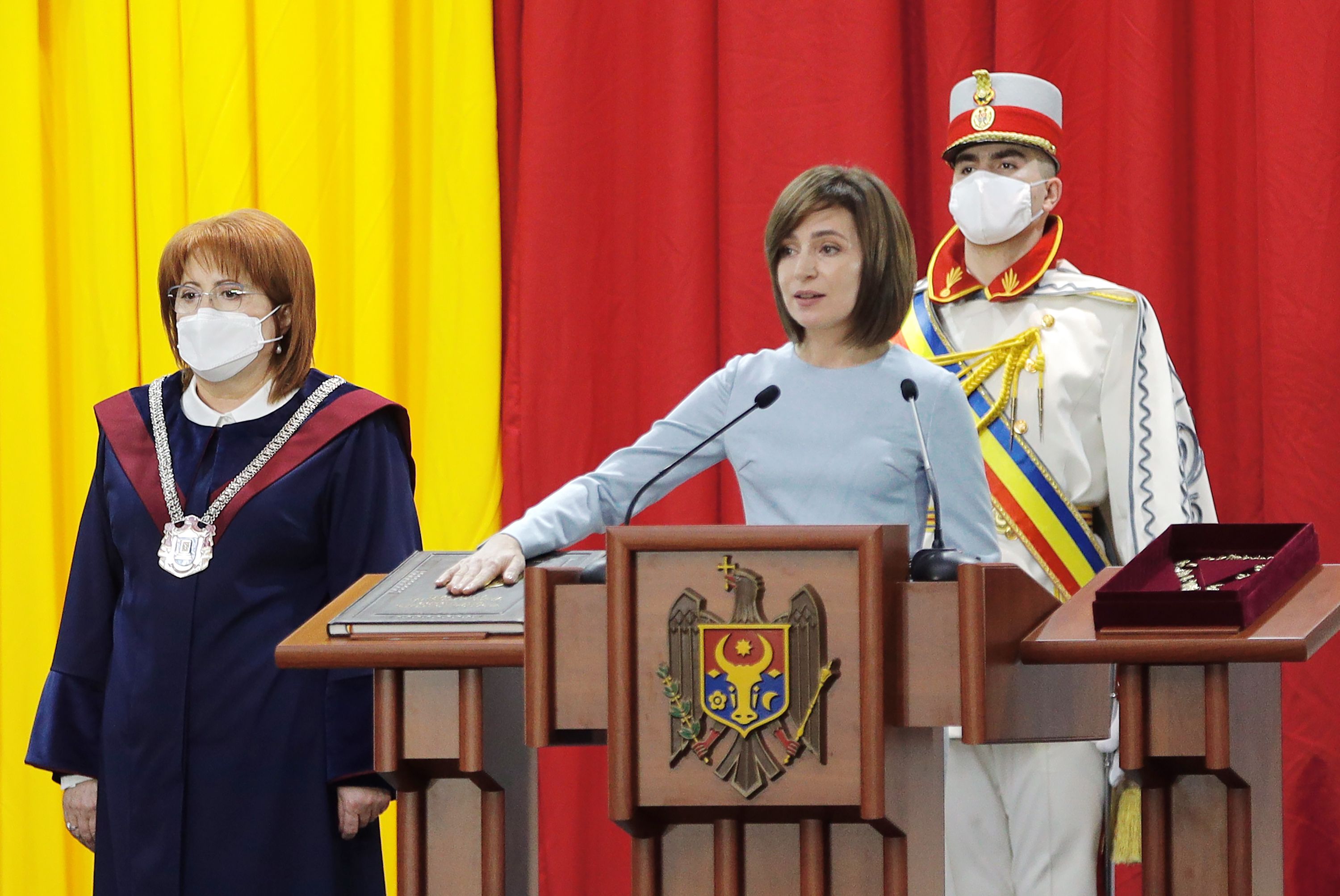A New Rapprochement in Romanian-Moldovan Relations
Since Maia Sandu became president of Moldova in December 2020, Romanian-Moldovan relations have steadily improved. In November 2021 she met for a fourth time with Romanian President Klaus Iohannis, signing a “roadmap” of cooperation. Both countries recognise that a linguistic, historical, and cultural community binds them, however the challenge is to move from declarations to the implementation of projects, especially in infrastructure. Romania’s effective involvement in such projects, given its special ties with Moldova, may contribute to the success of its pro-European transformation, which is also supported by Poland.
 Fot. Reuters/ VLADISLAV CULIOMZA / FORUM
Fot. Reuters/ VLADISLAV CULIOMZA / FORUM
Support for the Pro-European Authorities
From the beginning of her term in office, President Sandu has strived to normalise relations with Romania. This was reflected in Iohannis’s visit to Chişinău at the end of December 2020. The effect was to increase Romanian humanitarian aid in the form of 6,000 tonnes of agricultural fuel, medical equipment, and more than 500,000 COVID-19 vaccine doses to date. Previously, relations were frozen due to the pro-Russia and openly anti-Romania rule in Moldova of President Igor Dodon and his Party of Socialists. The obstruction was visible in March 2021 when an agreement on Romanian non-returnable aid expired despite accepting only €32 million of the €100 million allocated for various projects, including 196 school buses and the renovation of about 1,200 kindergartens.
The appointment of the Natalia Gavriliţa cabinet by the pro-Sandu Party of Action and Solidarity (PAS) in Moldova in August 2021 has enabled the implementation of projects with Romania. This was made more concrete by Gavriliţa’s visit to Bucharest in December 2021, and the plans should be further developed during a joint government meeting set for the beginning of 2022. The basis of cooperation in several sectors is the “roadmap”, which takes into account the community identity of the two countries. Romania also declares its support for the pro-European reforms of PAS. It offers its own institutional and legislative experience, facilitated by a common language. Moldova is using this experience in its reform of competition protection and energy regulation systems. In addition, ministers of both states agreed to establish a commission for obtaining EU funds for joint projects. They also have consulted on the adaptation in Moldova of Romanian solutions against organised crime and corruption, whose effectiveness has been proven by the sentences on leading politicians and the election of Laura Codruţa Kövesi, head of the Romanian National Anticorruption Directorate, as the chief prosecutor of the European Public Prosecutor’s Office.
Romanian diplomacy also more strongly promotes Moldova’s interests on the EU forum. This is confirmed by its efforts to obtain EU aid during the autumn gas crisis caused by Gazprom. Before the December Eastern Partnership summit, Romania also lobbied for an ambitious cooperation programme for the Associated Trio (Moldova, Georgia, Ukraine). Iohannis also called on EU partners to determine whether Moldova could be given membership prospects in the future.
Uniqueness of the Relationship
Romania strives for the closest relations with Moldova because recognises it as a second national Romanian state. The territory between the Prut and Dniester rivers is part of the historical Bessarabia, annexed in 1940 by the USSR. Unification, although it is not the main topic, is constantly present in the Romanian debate. It is openly demanded by the extreme nationalist Alliance for Romanian Unity. The remaining parties do not rule it out for fear of being criticised by voters. In a LARICS survey in 2021, unification was supported by 70% of respondents, although only 43% think it is possible, with 14% against it. The Romanian authorities consider Moldova’s accession to the EU to be the only possible form of removing the barriers between the inhabitants of both banks of the Prut.
On the other hand, in Moldova the issue of unification is not closely related to the sense of Romanian national identity—in the 2014 census, only 7% of inhabitants declared they were Romanians (excluding Transnistria). It results from pragmatism conditioned by a lack of faith in the reform of the Moldovan state. This was confirmed in an IMAS poll from 2021 in which 50% of respondents would support unification if it meant equalling salaries with Romanians, but the Moldovan GDP per capita in 2020 is $3,250, while Romania’s is $10,830. Numerous inhabitants of Moldova apply for Romanian citizenship, which, as descendants of its former citizens, they can receive in a simplified process. In 2010-2021, about 40% of the population paid to get one, usually to work in the EU without additional formalities. The theme of reunification has been used by Dodon and the now opposition parties that comprise the Electoral Bloc of Communist and Socialist (BECS) to mobilise voters. In their rhetoric, they claim fears among the older generation and the Russian-speaking minorities (17% of Moldova) against alleged Romanian imperialism. BECS wrongly accuses PAS and Sandu of striving to reunify. These accusations have not affected the leaders’ ratings, though, as they are not strictly identity issues, traditional in the Moldovan debate, but refer to the fight against corruption and the need to repair the state. In interviews, Sandu emphasises that unification would require not only the support of the majority but also a general consensus of Moldovan citizens.
Mutual Disappointments
The development of infrastructural connections is of key importance for deeper rapprochement between Romania and Moldova. Gavriliţa’s visit to Bucharest resulted in the resumption of a train connection between the capitals, suspended since 2019. On the other hand, a few days earlier, the Romanian authorities presented a new road construction plan to 2030. Investments in northeastern Romania, including the Union Highway connecting the country’s interior with the Moldovan border, lost priority. Only domestic criticism forced the Romanian government to withdraw this change. It also restores the chance to start building the bridge in Ungheni at the terminus of the road. Currently, although Romania is Moldova’s main economic partner, accounting for about 27.5% of total trade, there are only six road crossings on the 681 km border along the Prut, compared to the pre-Second World War Bessarabia, which was connected to the rest of the country by 25 road bridges.
The Romanian authorities support investments that would make Moldova independent from Russian energy. However, they also signal disappointment with Moldova’s failure to take into account Romania’s interests. In autumn 2021, during the gas crisis, Romania lent small volumes of gas to Moldova through the Iaşi-Ungheni-Chişinău interconnector, built and owned by the Romanian state-owned company. Its annual capacity of 1.5 billion m3 corresponds to Moldova’s full yearly demand (excluding Transnistria). Although Romania itself can cover only part of it before the start of production from the Black Sea deposits around 2024, such a contract would help the Moldovan authorities strengthen their negotiating position in relation to Russia. Nevertheless, they concluded a new contract with Gazprom for five years for the full volume. They have considered the interconnector only a resource during a crisis, which makes the pipeline permanently unprofitable for the Romanian company because gas from Romania is more expensive than from Russia. The authorities in Bucharest are also not satisfied with how Moldova handled its tender for the €260 million Vulcăneşti-Chişinău high-voltage line, which will enable the transmission of electricity from Romania. It was won by an Indian company and the Romanian firm was excluded over formal—allegedly minor—shortcomings.
Conclusions
Romanian-Moldovan relations extend beyond the framework of close, good-neighbourly relations due to identity issues. This guarantees that Romania will continue to be one of the staunchest supporters of Moldova’s pro-European aspirations. However, the strong emotional charge accompanying these relations means that Romania may misplace the importance of symbolic actions over the effective implementation of reforms in Moldova and joint infrastructure projects.
The interest of Poland, a co-initiator and one of the main advocates of the Eastern Partnership, is to support pro-European changes in Moldova. The advantage of the latter’s cooperation with Romania is the potential formed by their shared linguistic and cultural community, which allows easier adaptation of proven institutional and legislative solutions. However, at the same time, Polish diplomacy may point out to their Romanian partners the advantages of lesser emphasis on identity issues. Raising them may polarise Moldovan society and hinder President Sandu and PAS. Both countries could cooperate on the EU forum on the establishment of the European Commission Support Group for Moldova, which would more effectively implement EU assistance for the Moldovan transformation. Cooperation with Romania at the governmental level may be facilitated by the position of the Polish prime minister’s plenipotentiary for supporting reforms in Moldova, established in September 2021.





